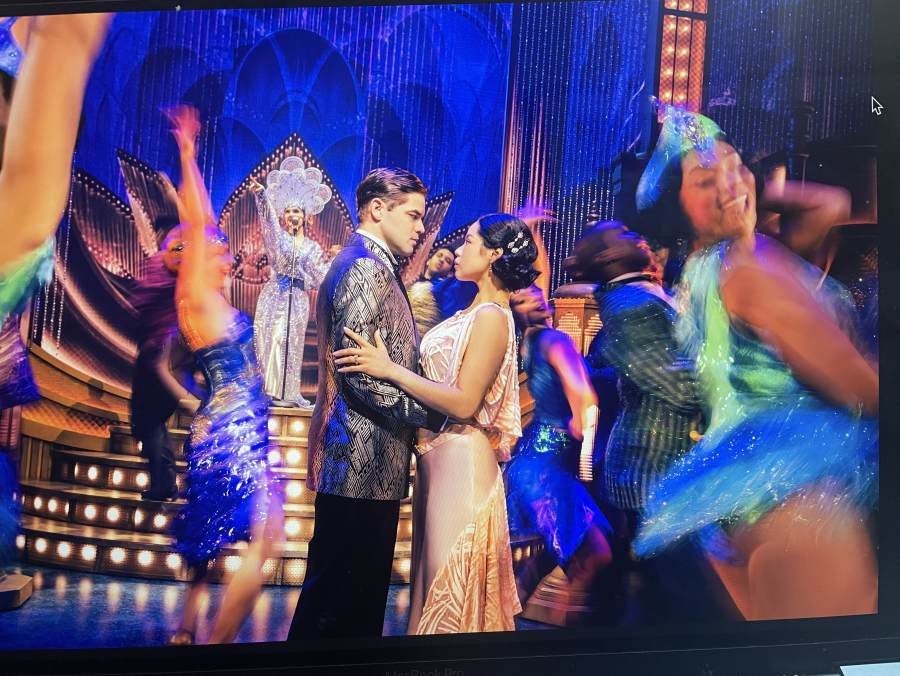

In 2002, Long Island Reads initiated a program designed to bring together readers in Nassau and Suffolk Counties to discuss a Long Island-related book. Unsurprisingly, the first book was the classic novel, The Great Gatsby by F. Scott Fitzgerald.
Now it is a new musical at the Broadway Theatre. The Great Gatsby is set on Long Island and focuses on the fictional East Egg where the old money lives and West Egg is populated by the nouveau riche and gangsters.
The story centers on the enigmatic wealthy Jay Gatsby who is determined to reclaim the love he lost when he went off to war. Amidst the backdrop of the Roaring 20’s that provides an opportunity for glittering costumes designed by Linda Cho, Gatsby buys land in West Egg and builds an enormous decadent mansion. It is directly across the Sound from where his lost love Daisy Buchanan lives with her brutish philandering husband, Tom (an awkward John Zdrojeski.) Hoping to get her attention, Gatsby throws lavish parties where we see some wonderful dancing (choreography by Dominique Kelley.) However, Daisy is now a married woman with a small daughter and is somewhat tethered to the house. In the meantime, her husband is having an affair with the gas station owner’s wife Myrtle (feisty talented Sara Chase.)
When Daisy’s cousin Nick (a wonderful Noah J. Ricketts) appears, he is befriended by Gatsby who gets him to act as a go-between so that the two lovers can reunite. Passion is reignited followed by tragedy and finally revenge. Unlike the novel, Nick is more than the narrator; he’s the moral compass of the show. At first in awe of the wealth and privilege, he comes to realize that these entitled people are only looking out for themselves.
As Gatsby, Jeremy Jordan, (Newsies, Little Shop of Horrors) is an obvious crowd favorite. His singing in the higher range is bit shrill, but generally he was in good voice. For some reason he adopts an accent and uses the phrase “old chap” liberally. He explains it was from when he attended Oxford for a short time. The accent felt artificial and made him seem less than genuine. Jordan’s portrayal of Gatsby does not allow us to sympathize with him. Gatsby has a good voice, debonair air, slicked down hair and impressive wardrobe and he is motivated by love. But Gatsby is hardly a good guy.
It’s the change in the book by Kait Kerrigan, which makes us relate more to Nick. Ricketts gets a lot of stage time, and he makes the most of it. Fortunately, Ricketts is quite talented and gets to perform several songs. First trapped in an awkward situation with Tom and his mistress, he wishes he were somewhere else and sings “The Met.” Then Nick gets romantically involved with Jordan, a single friend of Daisy’s who is an amateur golfer. Jordan, played by Samantha Pauly (“Six,”) is brash and outspoken and a feminist ahead of her time. Dismayed by the marriages she sees around her; she’s determined to remain single.
As Daisy, Eva Nobelada (Hadestown) is perfectly cast. She has a beautiful voice and is soft-spoken, wispy, and sylphlike, conveying a dreamlike quality. It’s easy to understand Gatsby’s love for her. Yet Daisy is weak and blames it on her gender and the role women are given. She remains with Tom, who despite his money and pedigree, is a bullying boorish man, quick to anger. Tom strikes Myrtle, breaking her nose and is menacing towards Daisy.
The music (composer Jason Howland with lyrics by Nathan Tysen) reflects many styles but the rousing jazzy 1920’s sounds are the most exciting. Each of the main characters gets a ballad or two to show off their vocal skills. In a theater season featuring some spectacular set designs, The Great Gatsby is outstanding. The home is reminiscent of the Art Deco of Radio City. Like the man himself, the scenic and projection designs are lavish and opulent. (I predict that the designer Paul Tate Depoo III will receive several theater nominations this season.)
Directed by Marc Bruni (“The Carole King Musical”,) The Great Gatsby: A New Musical is a visual feast for the eyes. It boasts gorgeous settings, resplendent costumes and talented performers. The irony is that, despite his ill-gotten wealth, Jay Gatsby is a sad lonely man and far from “great.”
This post war time was a period of decadence, impulsiveness and abandon. At first, impressed by the money he sees around him; Nick introduces the show and then has the final concluding speech. Nick stands in for the audience and is repelled by the self-centeredness and attitudes of the ‘old money.’ He reminds us of the importance of caring for others.
Broadway Theatre
53rd and Broadway
New York, NY 10019